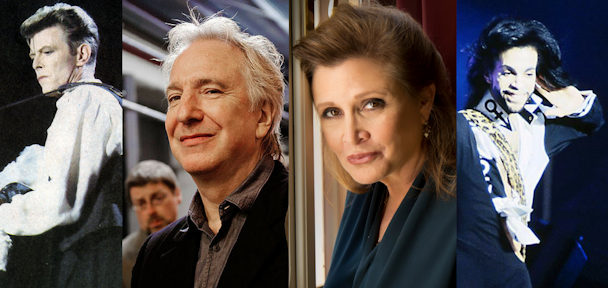Celebrity Deaths are big news whether true or not - Sorry guys, 2017 is only going to feel worse
It's gone well beyond a joke that 2016 has been a terrible year, in particular with no much-loved celebrity safe from the curse it brings. Bookended by David Bowie and George Michael, Carrie Fisher and now Debbie Reynolds with countless other dearly loved names along the way, and compounded by a couple of huge political upsets it certainly has felt like a rough year. The bad news, for those who have willed in the start of 2017, is that the stars are aligning to make that even worse.

I haven't done a detailed scientific analysis of celebrity mortality rates but I'd suggest there are two big factors at work here: firstly the possibility that there have genuinely been more famous deaths this year; and secondly that there have merely felt like there have been more.
On the first one it's likely fair to say that more people than ever died in 2016, that's a simple function of how the Earth's population has steadily increased. Perhaps more insightful is the point that entertainment as an industry really boomed in the 60s, 70s and into the 80s and we're now getting to a point where the icons of those decades are quite naturally coming to the end of their roads. Expect some further sad times ahead, it may indeed be the case that more notable people are dying than ever before.
Of more interest to me however is the phenomena whereby celebrity deaths have come to be felt far more widely than ever. Once upon a time a death would be calmly commemorated in a newspaper obituary, or on the nightly TV news, once it had been made officially public. Today rumours of a celebrity's passing (whether true or false) spread rapidly across social media platforms and once confirmed the outpouring of emotion, and hunger for information, is immediate.
Famous deaths have grabbed the public's attention so dramatically this year that, rather morbidly, they've become big business. The race to have the best obituary, tribute, highlights montage or other piece of content is intense - in a few short hours the pieces which stand out can be shared hundreds of thousands of times, bringing millions of readers onto news websites. Whilst pre-written obituaries where once the reserve of royalty I wouldn't be surprised if teams were working up content on hundreds of pensioners as we speak.
2016's reputation as a year where many great people pass away has only intensified this trend - every passing away is further fuel to the fire, and far more people than ever before are now publicly engaging with these once private moments. It became a self-fulfilling prophecy that we felt the loss of so many people because we began making a bigger deal about it every time it happened. It's hard to imagine that a '2017 is even worse' narrative won't also grab attention so sadly whoever may leave us this coming year are likely to get accidentally drawn into a cycle of further click bait.
The same need to drive clicks and in turn revenues led to the huge boom in fake news sites during the US election, not to mention the wall to wall coverage of Trump by traditional media themselves. For the most part fake news sites have little political agenda of their own, they just want to attract as much traffic as possible and are willing to say just about anything to achieve that goal.
Now of course I'm not saying that marking the passing of a great person is comparable to fake news reporting, nor that we should stop doing so and paying our respects. News editors have always known that bad news sells papers, but in our digital world that feedback loop has just become even faster and more influential. Editors' no longer have the time to weigh up big content decisions, they have to race to put something out (anything!) before the competition does and soaks up all the eyeballs.
Social media, blogs and the like have levelled the playing field of media and allowed everyone to be a journalist. Advertisers in search of cheap clicks and as many eyeballs as possible have incentivised all in the media to race down an ever narrowing pathway to try and stay afloat. Citizen journalism, live broadcasting and the like might suggest that we no longer need true reporters, but the thoroughness and integrity of investigation they can bring has never been more needed.
Our own morbid curiosity pretty much guarantees that 2017 will FEEL even worse than 2016, even without as many big political upsets to come (our former European friends may still have some up their sleeves). Only time will tell if traditional media can once again carve out a role for itself as a truly reliable, and profitable, source... or if social media sharing will instead erode the notion of truth completely. For now we all need to be vigilant about what we're reading and the narratives we're adding to.
Jerry Daykin is global digital partner at Carat. He tweets @jdaykin
